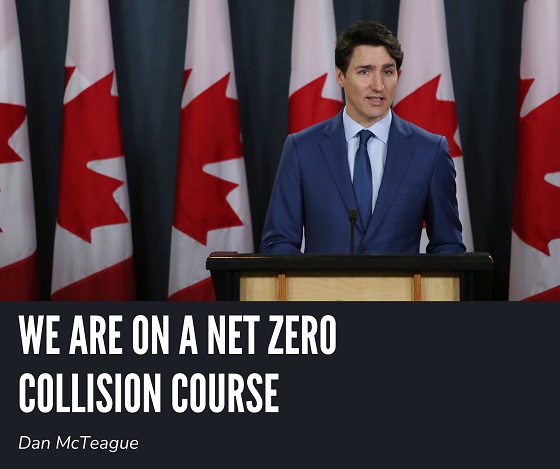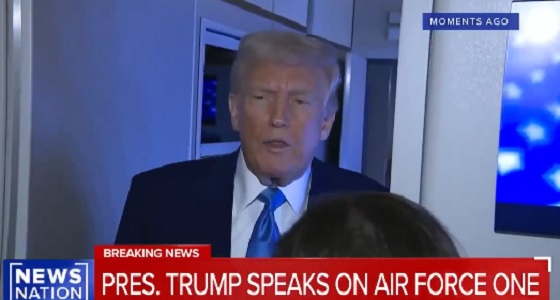Dan McTeague
We are on a Net Zero collision course


Welcome to 2024 where the threat of looming power outages in a resource-rich, developed country is a reality. And we have Justin Trudeau and his ideologically-driven caucus to thank for it.
In the past month alone, Alberta has issued four emergency alerts warning consumers to reduce demand or the grid could face the risk of rotating power outages. Residents were urged in one alert to immediately limit their electrical use to essential needs only.
According to the Alberta Energy System Operator (AESO,) which manages the grid, the alert was due to sustained cold temperatures. Alberta’s grid is more vulnerable in the winter due to the decreased opportunity to generate solar power with the shorter days and of course because during extreme cold, there is usually less opportunity for wind power generation.
Thank goodness for hydrocarbons since over those days more than 80% of Alberta’s power came from natural gas and to a lesser extent, coal.
This situation in Alberta should serve as a warning for the rest of the country.
That’s because the Trudeau government is aggressively moving forward with their Clean Electricity Regulations which mandate that by 2035 the Canadian grid be zero emissions. This means the entire country will increasingly be reliant on unreliable energy sources.
And last month, the Trudeau Liberals implemented their Electric Vehicle Availability Standard, which mandates all new light-duty cars and trucks must be zero emission by 2035 as well. In other words, after 2035 forget about purchasing a new gas-powered car or diesel-driven truck. Welcome to Trudeau’s Net Zero world!
Many Canadians are wondering how we are going to produce the energy to power our cars along with everything else in our lives, especially in the depths of the cold winter months.
And the answer is simply, “we can’t.”
We are on a collision course of the Liberal government’s making. In their ideological zeal to achieve Net Zero, they seem to have been completely unhinged from reality.
As I like to remind people, Canada contributes 1.5% of global greenhouse gas (GHG) emissions. Even if we halted all use of fossil fuels in our country it would have no global effect on world CO2 levels.
We can see the consequences of this pursuit of Net Zero, in Europe. Germany has frantically put coal power back on the grid in order to meet electricity demand. The UK is slamming the breaks on EVs and stepping up North Sea oil exploration. Italy is spending billions trying to fill its energy gaps with natural gas from Libya.
We are staring down the barrel of an upcoming election and if we want to ensure our quality of life, we need a major course correction. This does not mean delaying the implementation of EV regulations, or emissions caps, or even simply pushing back Net Zero target dates.
No. We need a party that will stand up against Net Zero and its related policies. We need a government that will see that this is a suicide mission we need to abandon entirely, not simply punt down the road.
Let’s hope we don’t have to wait for the worst-case scenario before Canadians finally realize the standard of living and access to affordable energy cannot be taken for granted. We truly are on a collision course with reality, due to ideological government policies that will have a crippling effect on our economy and way of life.
Dan McTeague is President of Canadians for Affordable Energy
2025 Federal Election
I don’t believe these polls!

 Dan McTeague
Dan McTeague
Cards on the table, I’m skeptical of the current state of the polling in this election. My sense is that Mark Carney and the Liberals’ numbers are, at least in part, a byproduct of sympathetic pollsters over-sampling their key demographics, and those being trumpeted to high heaven by the publicly-funded media. That, coupled with voters’ justifiable annoyance at Donald Trump’s “51st State” cracks and tariff threats, has contributed to an illusion of enthusiasm, a sense that they are running away with this thing.
That said, one polling data point has struck me as being both real and important. A recent Abacus Data poll showed that, when you cut out all the distractions, Canadians’ biggest concern remains our inflated cost of living. And that is an issue which clearly favors Poilievre and the Conservatives.
That’s because the dire state of our economy can largely be laid at the feet of the Liberals, who’ve been running the show for the past decade. Yes, they’ve made a change at the top, but not much of one. On top of being a globe-trotting member of the “Green” Elite, and champion of environmentalist banking, Mark Carney was a Liberal advisor for years, a key part of the Trudeau “brain trust” — trust me, I use that term loosely — that cooked up a whole raft of economy smothering “Green” policies which have done nothing to reduce global carbon emissions, but have succeeded in lightening our wallets.
Under Trudeau, our annual GDP growth noticeably shifted from the 3% range towards the end of the Harper years to the 1% range more recently. Household debt-to-income ratios rose steadily in the same period, while real household spending per capita dropped 2-3% below 2019 levels by 2024, as costs and interest rates went up. Disposable income growth has been outpaced by inflation and taxes, and bankruptcy filings have risen 40% since just 2019.
Canadian food prices have exploded by 35-40%, with family spending up over 50% over the past decade. Consequently, food insecurity rose to 23% by 2023, from around 8% in 2015, and Food Banks Canada has reported a 78% surge in usage from 2019 to 2023.
Meanwhile, Canada’s national debt, which was just over $600 billion when Justin Trudeau was handed the federal credit card, has roughly doubled, reaching over $1.2 trillion by the time he left. And provincial debt has risen by about $1 trillion in the same period.
It’s a frightening financial snapshot. And many of these negatives can be attributed to the Liberals’ war on oil and gas, which remains — however much Carney might wish otherwise — the backbone of our national economy.
So much of the Liberals’ time and effort in government has been spent kneecapping the resource sector, and for purely ideological reasons. From Bill C-48, the Oil Tanker Moratorium Act of 2019, which significantly reduces our ability to sell oil and gas abroad, to Bill C-69, which added mountains of red tape for infrastructure projects, so much so that it was nicknamed the “No More Pipelines” Act.
You’ll remember that the Supreme Court ruled the “No More Pipelines” act largely unconstitutional two years ago. Even so, Carney recently said he has no intention of repealing it, prompting Poilievre to tweet out, “This Liberal law blocked BILLIONS of dollars of investment in oil & gas projects, pipelines, LNG plants, mines, and so much more,” with an excellent infographic attached, listing the various cancelled energy projects throughout Canada since the Liberals came to power.
And then of course, there’s the Consumer Carbon Tax, which started out at $20 per tonne of CO2 emitted in 2019, small enough that many Canadians barely noticed they were paying it, but increased every year until it hit $80 per tonne.
By that point it became so noticeable and unpopular that the Liberals felt they had no choice but to “cancel” it (“zero it out” is more accurate), before it could reach the $170 by 2030 which they’d planned. Still, it remains on the books, ready to be raised again, without a vote, if Carney so chooses.
Even if he doesn’t, Carney has doubled down on the Industrial Carbon Tax. While the Liberals claim this is an improvement because it isn’t paid by working Canadians, only by big evil “polluters.” Of course, they said something similar about the Consumer Tax, that by some financial wizardry, we regular folks would get back more than we paid in, which turned out to be total bunk.
Meanwhile, the Industrial Tax makes our lives more expensive in essentially the same way as the Consumer Tax. It raises the cost of doing business, of heating our homes, of filling up our car, of our grocery bills. It just does so by a less direct route, by taxing businesses instead of individuals, so that we pay when the price of goods and services goes up in response.
The Industrial Carbon Tax, much like Trudeau’s Clean Fuel Regulations, is ultimately a hidden tax, and that suits Carney just fine. He’d prefer that we not know who to blame as our cost of living skyrockets.
The Liberal Party’s economic record over since 2015 has been atrocious, and it will be no different under Mark Carney. He is complicit, and he continues to support policies which would make us poorer, like Bill S-243, the “Climate-Aligned Finance Act,” which Carney testified before the Senate in support of last year. That bill sought to make it nearly impossible for banks to invest in, or loan money to, oil and gas projects in Canada, and tried to force financial institutions to appoint board members ideologically opposed to fossil fuels.
Canada needs to change course, and soon. As things stand, it will be tough for even a good captain to navigate us through the rough seas the Liberals have steered us into over the past ten years. A few more, and with Mark Carney at the helm, might make that impossible.
Dan McTeague is President of Canadians for Affordable Energy.
Support Dan’s Work to Keep Canadian Energy Affordable!
Canadians for Affordable Energy is run by Dan McTeague, former MP and founder of Gas Wizard. We stand up and fight for more affordable energy.
2025 Federal Election
Don’t let the Liberals fool you on electric cars

 Dan McTeague
Dan McTeague
“The Liberals, hoodwinked by the ideological (and false) narrative that EVs are better for the environment, want to force you to replace the car or truck you love with one you can’t afford which doesn’t do what you need it to do.”
The Liberals’ carbon tax ploy is utterly shameless. For years they’ve been telling us that the Carbon Tax was a hallmark of Canadian patriotism, that it was the best way to save the planet, that it was really a “price on pollution,” which would ultimately benefit the little guy, in the form of a rebate in which Canadians would get back all the money they paid in, and more!
Meanwhile big, faceless Captain Planet villain corporations — who are out there wrecking the planet for the sheer fun of it! — will shoulder the whole burden.
But then, as people started to feel the hit to their wallets and polling on the topic fell off a cliff, the Liberals’ newly anointed leader — the environmentalist fanatic Mark Carney — threw himself a Trumpian signing ceremony, at which he and the party (at least rhetorically) kicked the carbon tax to the curb and started patting themselves on the back for saving Canada from the foul beast. “Don’t ask where it came from,” they seem to be saying. “The point is, it’s gone.”
Of course, it’s not. The Consumer Carbon Tax has been zeroed out, at least for the moment, not repealed. Meanwhile, the Industrial Carbon Tax, on business and industry, is not only being left in place, it’s being talked up in exactly the same terms as the Consumer Tax was.
No matter that it will continue to go up at the same rate as the Consumer Tax would have, such that it will be indistinguishable from the Consumer Tax by 2030. And no matter that the burden of that tax will ultimately be passed down to working Canadians in the form of higher prices.
Of course, when that happens, Carney & Co will probably blame Donald Trump, rather than their own crooked tax regime.
Yes, it is shameless. But it also puts Pierre Poilievre and the Conservatives in a bind. They’ve been proclaiming their intention to “Axe the Tax” for quite some time now. On the energy file, it was pretty much all you could get them to talk about. So much so that I was worried that upon entering government, they might just go after the low hanging fruit, repeal the Carbon Tax, and move on to other things, leaving the rest of the rotten Net-Zero superstructure in place.
But now, since the Liberals beat them to it (or claim they did,) the Conservatives are left grasping for a straightforward, signature policy which they can use to differentiate themselves from their opponents.
Poilievre’s recently announced intention to kill the Industrial Carbon Tax is welcome, especially at a time when Canadian business is under a tariff threat from both the U.S. and China. But that requires some explanation, and as the old political saying goes, “If you’re explaining, you’re losing.”
There is one policy change however, which comes to mind as a potential replacement. It’s bold, it would make the lives of Canadians materially better, and it’s so deeply interwoven with the “Green” grift of the environmentalist movement of which Mark Carney is so much a part that his party couldn’t possibly bring themselves to steal it.
Pierre Poilievre should pledge to repeal the Liberals’ Electric Vehicle mandate.
The EV mandate is bad policy. It forces Canadians to buy an expensive product — EVs cost more than Internal Combustion Engine (ICE) vehicles even when the federal government was subsidizing their purchase with a taxpayer-funded rebate of $5,000 per vehicle, but that program ran out of money in January and was discontinued. Without that rebate, EVs haven’t a prayer of competing with ICE vehicles.
EVs are particularly ill-suited for Canada. Their batteries are bad at holding a charge in the cold. Even in mild weather, EVs aren’t known for their reliability, a major downside in a country as spread out as ours. Maybe it’ll work out if you live in a big city, but what if you’re in the country? Heaven help you if your EV battery dies when you’re an hour away from everywhere.
Moreover, Canada doesn’t have the infrastructure to support a total replacement of gas-and-diesel driven vehicles with EVs. Our already-strained electrical grid just doesn’t have the capacity to support millions of EVs being plugged in every night. Natural Resources Canada estimates that we will need somewhere in the neighborhood of 450,000 public charging stations to support an entirely electric fleet. At the moment, we have roughly 30,000. That’s a pretty big gap to fill in ten years.
And that’s another fact which doesn’t get nearly as much attention as it should. The law mandates that every new vehicle sold in Canada must be electric by 2035. Maybe that sounded incredibly far in the future when it was passed, but now it’s only ten years away! That’s not a lot of time for these technological problems or cost issues to be resolved.
So the pitch from Poilievre here is simple.
“The Liberals, hoodwinked by the ideological (and false) narrative that EVs are better for the environment, want to force you to replace the car or truck you love with one you can’t afford which doesn’t do what you need it to do. If you vote Conservative, we will fix that, so you will be free to buy the vehicle that meets your needs, whether it’s battery or gas powered, because we trust you to make decisions for yourself. Mark Carney, on the other hand, does not. We won’t just Axe the Tax, we will End the EV Mandate!”
A decade (and counting) of Liberal misrule has saddled this country with a raft of onerous and expensive Net-Zero legislation I’d like to see the Conservative Party campaign against.
These include so-called “Clean Fuel” Regulations, Emissions Caps, their war on pipelines and Natural Gas terminals, not to mention Bill C-59, which bans businesses from touting the environmental benefits of their work if it doesn’t meet a government-approved standard.
But the EV mandate is bad for Canada, and terrible for Canadians. A pledge to repeal it would be an excellent start.
Dan McTeague is President of Canadians for Affordable Energy.
-

 Courageous Discourse2 days ago
Courageous Discourse2 days agoEurope Had 127,350 Cases of Measles in 2024
-

 Podcasts1 day ago
Podcasts1 day agoTrump’s Tariffs: The US, Canada, and the rest of the world
-

 2025 Federal Election1 day ago
2025 Federal Election1 day agoMark Carney Comes to B.C. and Delivers a Masterclass in Liberal Arrogance
-

 Alberta1 day ago
Alberta1 day agoProvince introducing “Patient-Focused Funding Model” to fund acute care in Alberta
-

 2025 Federal Election1 day ago
2025 Federal Election1 day agoPoilievre to invest in recovery, cut off federal funding for opioids and defund drug dens
-

 Business1 day ago
Business1 day agoTrump threatens additional 50% tariffs on China, urges ‘patience’
-

 Alberta1 day ago
Alberta1 day agoMedical regulator stops short of revoking license of Alberta doctor skeptic of COVID vaccine
-

 Business2 days ago
Business2 days agoTrump says tariffs on China will remain until trade imbalance is corrected




